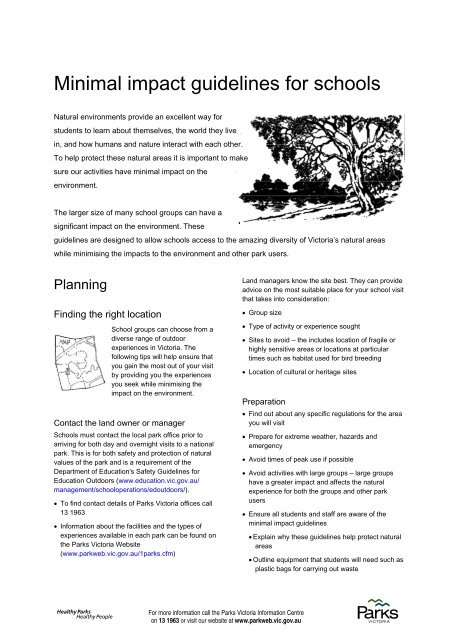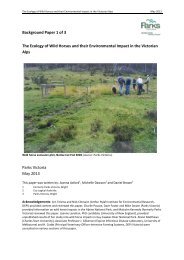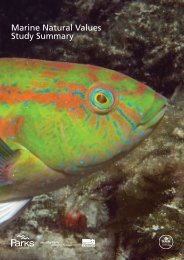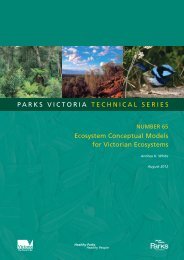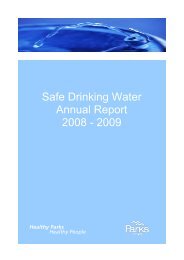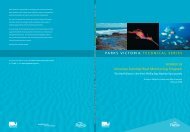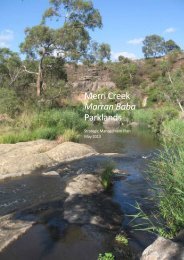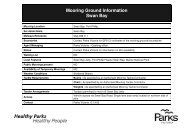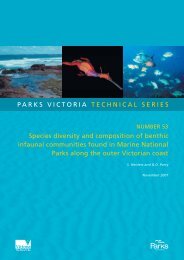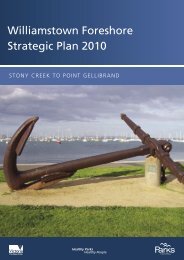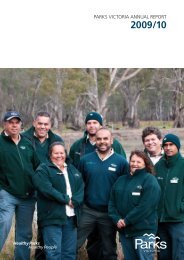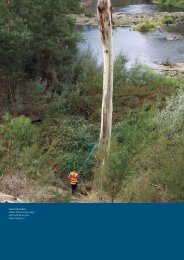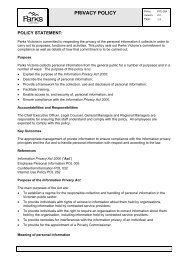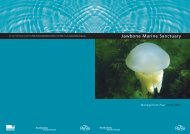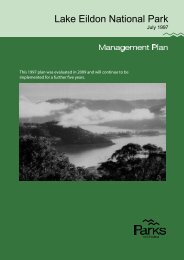Minimal Impact Guidelines for Schools - Parks Victoria
Minimal Impact Guidelines for Schools - Parks Victoria
Minimal Impact Guidelines for Schools - Parks Victoria
Create successful ePaper yourself
Turn your PDF publications into a flip-book with our unique Google optimized e-Paper software.
<strong>Minimal</strong> impact guidelines <strong>for</strong> schoolsNatural environments provide an excellent way <strong>for</strong>students to learn about themselves, the world they livein, and how humans and nature interact with each other.To help protect these natural areas it is important to makesure our activities have minimal impact on theenvironment.The larger size of many school groups can have asignificant impact on the environment. Theseguidelines are designed to allow schools access to the amazing diversity of <strong>Victoria</strong>’s natural areaswhile minimising the impacts to the environment and other park users.PlanningFinding the right locationSchool groups can choose from adiverse range of outdoorexperiences in <strong>Victoria</strong>. Thefollowing tips will help ensure thatyou gain the most out of your visitby providing you the experiencesyou seek while minimising theimpact on the environment.Contact the land owner or manager<strong>Schools</strong> must contact the local park office prior toarriving <strong>for</strong> both day and overnight visits to a nationalpark. This is <strong>for</strong> both safety and protection of naturalvalues of the park and is a requirement of theDepartment of Education's Safety <strong>Guidelines</strong> <strong>for</strong>Education Outdoors (www.education.vic.gov.au/management/schooloperations/edoutdoors/). To find contact details of <strong>Parks</strong> <strong>Victoria</strong> offices call13 1963 In<strong>for</strong>mation about the facilities and the types ofexperiences available in each park can be found onthe <strong>Parks</strong> <strong>Victoria</strong> Website(www.parkweb.vic.gov.au/1parks.cfm)Land managers know the site best. They can provideadvice on the most suitable place <strong>for</strong> your school visitthat takes into consideration: Group size Type of activity or experience sought Sites to avoid – the includes location of fragile orhighly sensitive areas or locations at particulartimes such as habitat used <strong>for</strong> bird breeding Location of cultural or heritage sitesPreparation Find out about any specific regulations <strong>for</strong> the areayou will visit Prepare <strong>for</strong> extreme weather, hazards andemergency Avoid times of peak use if possible Avoid activities with large groups – large groupshave a greater impact and affects the naturalexperience <strong>for</strong> both the groups and other parkusers Ensure all students and staff are aware of theminimal impact guidelines Explain why these guidelines help protect naturalareas Outline equipment that students will need such asplastic bags <strong>for</strong> carrying out wasteFor more in<strong>for</strong>mation call the <strong>Parks</strong> <strong>Victoria</strong> In<strong>for</strong>mation Centreon 13 1963 or visit our website at www.parkweb.vic.gov.au
On arrivalStudents should be briefed on ways they can minimisetheir impact. By contacting the park office be<strong>for</strong>ehand,you may be able to arrange <strong>for</strong> a park ranger to deliverminimal impact and safety messages as well as tellyour students about the great natural features of thepark.Remember to rein<strong>for</strong>ce good practices throughout yourvisit by providing positive feedback to studentsfollowing the guidelines. Positive phrasing makesmessages more effective: Stay on track rather than don’t walk off track Observe and listen rather than don’t touch Leave things where they are instead of don’t take Healthy animals only eat their natural food ratherthan don’t feed the animalsAll native plants, animals, geological features,historical and cultural remains are protected by law innational parks. Ensure that they remain undisturbed.Tread lightlyTracks are carefullydesigned to allow peopleto visit naturalenvironments whileminimising the impact onthe environment. Stayingon track minimiseserosion, limits spreadingof diseases and weeds,and helps you from getting lost.Actions Stay on the track at all times – even if rough ormuddy don’t widen tracks or take shortcuts Using track edges, the sides of a track or cuttingcorners increases damage, erosion and visualscarring Walking through muddy sections keeps the impactto a narrow area Keep groups small. Smaller groups have a lowerimpact and enhances the experience <strong>for</strong> groupmembers On rougher tracks, stay on rocks and hard groundwherever possible. Avoid stepping on vegetation Cutting new tracks is illegal Do not mark tracks with cairns, tape or othermaterials. This is unsightly and can confuse otherpark users Avoid the spread of phytophthora and other soilbornediseases Clean boots, tyres and camping equipment cleanbe<strong>for</strong>e entering a new areaRubbishSchool groups are expected to take allrubbish out of a park with them.Rubbish left in a park can causehazards to animals and other parkusers.You may find bins in some parks. Bins full oroverflowing with rubbish attract animals looking <strong>for</strong>food. Animals can get sick eating rubbish and therubbish may be spread throughout the park. To avoidthis, it is best to take your rubbish home with youeven if there is a bin provided.Actions Pack to minimise rubbish. Don’t take potentialrubbish such as bottles, cans and excess wrapping Take a plastic bag or container <strong>for</strong> your rubbish Carry out all rubbish including food scraps and lollywrappers Pick up rubbish that you may find along the way Make sure animals can’t get to your rubbish bag –plastic bags full of rubbish are a target <strong>for</strong> animalslooking <strong>for</strong> food. Take care especially at nightwhen camping.Human wastesHuman wastes can contaminate waterwaysand cause disease.Actions Make use of toilet facilities where they exist, even ifyou don’t really need to go In areas without toilets Take a hand trowel Choose a spot at least 100m away fromcampsites and watercourses Use a different area each time. This spread theimpact over a wider area Dig a hole 15cm deep. Bury all faecal waste andpaper, mixing it with soil to help decompositionand to discourage animals Carry out all personal items like sanitary pads andtamponsFor more in<strong>for</strong>mation call the <strong>Parks</strong> <strong>Victoria</strong> In<strong>for</strong>mation Centreon 13 1963 or visit our website at www.parkweb.vic.gov.au
Camping<strong>Parks</strong> <strong>Victoria</strong> manages a range of campsites whichprovide a diverse range of experiences <strong>for</strong> schoolgroups. These range from large campgrounds withtoilet and shower facilities suitable <strong>for</strong> larger groupsthrough to remote locations which may only be suitable<strong>for</strong> groups up to six people.Actions Call <strong>Parks</strong> <strong>Victoria</strong> on 13 1963 to find out themaximum group size allowed <strong>for</strong> the campgroundand if bookings are required Camp in designated spaces only. If there are nomore spaces left then the campground is full Keep your group together. This ensures that thereis enough space <strong>for</strong> others to also use thecampground Place tents on sandy or hard surfaces rather thanboggy or vegetated areas Digging trenches around tents is unnecessary –erect tents on a well-drained siteToo many campers at a site can destroy the vegetationaround the campground. This can cause erosion anddestroy habitat <strong>for</strong> native animals. Other park usersalso use these campgrounds. Too many students at asite can destroy the natural experience that these parkusers are seeking.PlanningPlanning is the most important step in minimising yourgroup’s impact on the environment. Local park rangershave the best in<strong>for</strong>mation and advice about selectingthe right campground to suit your needs.Actions Call <strong>Parks</strong> <strong>Victoria</strong> on 13 1963 to discuss whichparks provide suitable camping experiences <strong>for</strong> yourgroup Discuss issues such as group size, other activitiesyou plan to undertake, access to toilets and otherin<strong>for</strong>mation specific to the chosen site Take only what is essential Limit excess equipment or the size of tents andsupplies to what is actually needed Leave radios and other loud devices at home Ensure you have sufficient containers to carry out allof your group’s rubbishSetting up campEach campground has a cap on the number of peoplewho can camp there. These limits vary <strong>for</strong> each site soyou will need to discuss this with the local park office.The limits are set to ensure the natural values of thecampground are maintained and to minimise impactson the environment and other campers. Keep noise levels down at night. Noise can scareaway native animals and disturb other campers Ensure you follow the minimal impact guidelines<strong>for</strong> rubbish, waste and firesWashingDetergents, toothpaste and all types of soap harmfish and wildlife.Actions Don’t wash in streams and lakes - Wash at least50m away Scatter the washwater so that it filters through thesoil Use gritty sand and a scourer instead of soap toclean dishes Don’t throw food scraps into streams or lakesFood and wastesNative animals have adaptedover time to the food found innature. Human food can makeanimals sick. Feeding can alsomake animals reliant on humans<strong>for</strong> food. This can make them aggressive. In the offseason, many of these animals may starve or starteating other food sources that support other animals.Actions Keep your food and wastes in a secure container.Plastic bags are not secure – animals can easilyrip these open Be careful with food in tents. Wombats can eatthrough tent walls and some possums can openzips.For more in<strong>for</strong>mation call the <strong>Parks</strong> <strong>Victoria</strong> In<strong>for</strong>mation Centreon 13 1963 or visit our website at www.parkweb.vic.gov.au
Fires and stovesCamp fires cause impacts on the local environment.Collecting firewood removes habitat <strong>for</strong> many plants,animals, fungi and bacteria. This in turn takes awayfood sources <strong>for</strong> other animals and prevents thenutrients being returned to the soil to help the nextgeneration of plants to grow. Camp fires can alsoescape and cause permanent damage to fragileecosystems. Gas fuel stoves burn cleaner, cook yourfood quicker, and their use will help to minimise yourgroup’s impact on the local environment.More in<strong>for</strong>mationFor activities in national, state, urban,regional and marine parks<strong>Parks</strong> <strong>Victoria</strong> in<strong>for</strong>mation line – 13 1963For activities in state <strong>for</strong>ests and otherCrown landDepartment of Sustainability and Environment –136 186Activities and environments<strong>Parks</strong> <strong>Victoria</strong> provides minimum impact guidelines<strong>for</strong> a range of outdoor activities and environments.Actions School groups must use gas fuel stoves <strong>for</strong> cooking Fuel stoves should be used in an open area with nosurrounding leaf litter or vegetation On total fire ban days, fuel stoves cannot be used School groups can only have a camp fire if all of thefollowing conditions are met Campfires must be in a designated fireplace.These will either be a metal, brick or concretestructure All firewood and kindling needs to be brought intothe park by the school group. Do not collectfirewood in the park Only light one fire per schoolCyclinghttp://www.parkweb.vic.gov.au/1process_details.cfm?note=28Rock climbing / abseilinghttp://www.parkweb.vic.gov.au/1process_details.cfm?note=20Snorkelling / rock pool rambleshttp://www.parkweb.vic.gov.au/1process_details.cfm?note=31Alpine environmentshttp://www.parkweb.vic.gov.au/resources/14_1113.pdfHorse ridinghttp://www.parkweb.vic.gov.au/1process_details.cfm?note=22 Keep fires small Never light a fire on a hot windy day. It is illegal tolight a fire on a total fire ban day Ensure a teacher monitors the fire at all times Ensure that the fire is out prior to going to bed.Fires need to be extinguished with water – a firecovered by soil can still be alight undergroundOct 2010For more in<strong>for</strong>mation call the <strong>Parks</strong> <strong>Victoria</strong> In<strong>for</strong>mation Centreon 13 1963 or visit our website at www.parkweb.vic.gov.au


